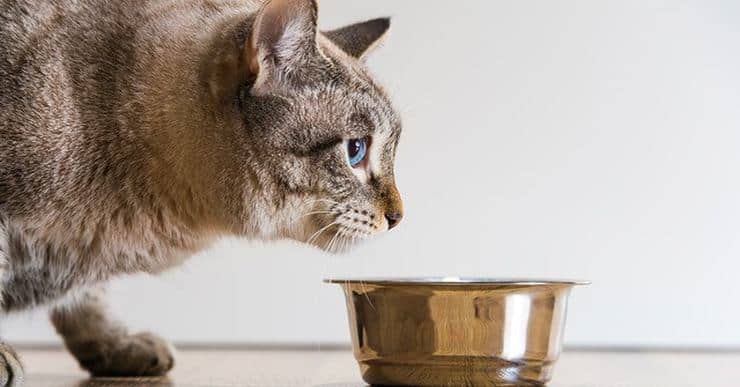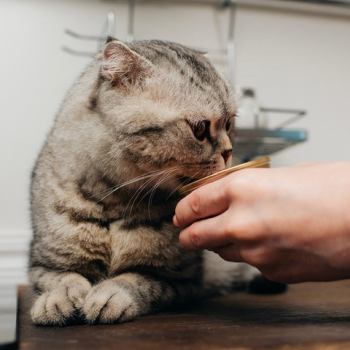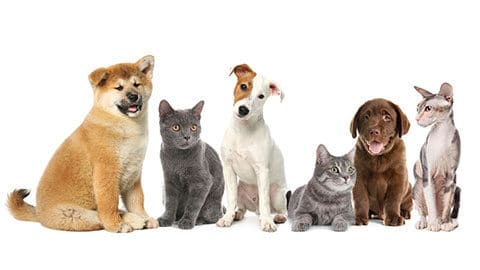
What is Your Senior Cat Eating?
Sponsored by Weruva
As cats age, their dietary needs can change in a number of ways. It’s time to reconsider what they are eating, especially if you have not been following my urgent recommendation to feed only wet food throughout any cat’s life for well-being and longevity. Here are a few things to keep in mind when feeding an older cat:
Protein: As cats age, they may lose muscle mass and organ function may decline. A diet higher in protein can help maintain muscle mass and support organ function in older cats. Look for a food that contains high-quality protein sources such as chicken or fish. These proteins are easily digestible and provide the essential amino acids that older cats need to maintain muscle mass and organ function.
Fiber: Constipation can be a common issue in older cats, so a diet with added fiber can help keep things moving smoothly. Fiber can also help control weight and blood sugar levels. Foods such as pumpkin or sweet potato can be a great source of dietary fiber for older cats. Look for cat foods that already include pumpkin in the recipe.
Hydration: As cats age, they may have a decreased thirst drive, so it’s important to make sure they are getting enough water. Wet food is always the healthiest option for any cats — because it contains more moisture than dry food — and this is especially true as your cat ages. Adding a water fountain or leaving a bowl of water out throughout the day can also encourage your senior feline to drink more.
Fat: Some senior cats may have trouble digesting fats, so a diet with lower fat content may be better tolerated. That’s something to discuss with your veterinarian on the twice-yearly wellness visits you need to schedule with your cat once he reaches 8 years old. There are doctors who might recommend a lower fat diet to help maintain a healthy weight and reduce the risk of certain health issues such as obesity and diabetes, but those of you who have followed my advice to avoid all “kitty krack” (dry food) throughout your cat’s life will most likely not have either of those problems!
 Vitamins & Minerals: Older cats may benefit from a diet fortified with vitamins and minerals to support overall health. Vitamin E, Vitamin C and Omega-3 fatty acids can help support joint health, skin and coat health, and cognitive function. However, most premium canned or pouched cat foods already have that in mind when they formulate their recipes.
Vitamins & Minerals: Older cats may benefit from a diet fortified with vitamins and minerals to support overall health. Vitamin E, Vitamin C and Omega-3 fatty acids can help support joint health, skin and coat health, and cognitive function. However, most premium canned or pouched cat foods already have that in mind when they formulate their recipes.
Your Cat is a Unique individual: Let’s not forget that every cat is different and may have her own dietary needs. Consult with your veterinarian to determine the best diet for your senior cat. The vet will take into account your cat’s age, overall health, and any disease or health issues that may affect the cat’s diet. For example, cats with kidney disease or diabetes will require a different diet than healthy older cats — but once again, if you’ve been feeding wet food to your cat the chance of having these problems is actually slim (and canned food is usually what veterinarians recommend to solve the problems often caused by feeding kitty krack!)
The takeaway? Older cats can benefit from a diet higher in protein and fiber, lower in fat, and fortified with vitamins and minerals. Consulting with a veterinarian and monitoring your cat’s health can help you determine the best diet for your senior feline. Additionally, regular exercise and mental stimulation can help keep your older cat healthy and engaged. Playing with your cat, providing interactive toys, or even simply spending time with them can help keep them mentally and physically active. With the right care and feeding, older cats can continue to live a happy and healthy life, sometimes into their 20s!
—Tracie Hotchner
(Have a comment? Share it on Facebook.)

